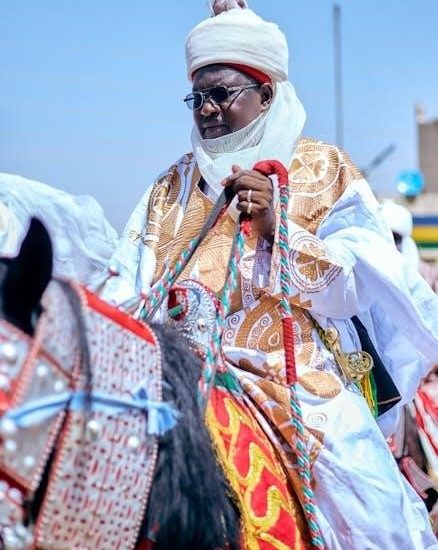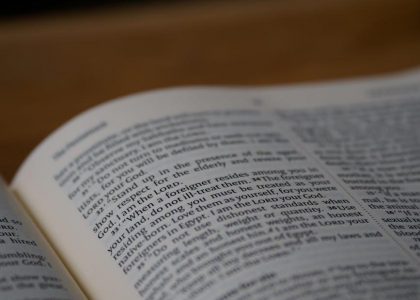Wole Soyinka’s play explores cultural clashes and tradition through Elesin’s ritual suicide‚ interrupted by colonial officer Simon Pilkings‚ highlighting Yoruba traditions and colonial impact․ The PDF is available for download and study․
Background and Significance
Death and the King’s Horseman‚ written by Wole Soyinka‚ is based on real events in 1946 Oyo‚ Nigeria․ The play revolves around Elesin‚ the king’s horseman‚ who is expected to commit ritual suicide following the king’s death․ This tradition is central to Yoruba culture‚ emphasizing duty and honor․ However‚ Simon Pilkings‚ a colonial officer‚ intervenes‚ causing a cultural clash․ The play explores themes of colonialism‚ tradition‚ and individual choice‚ making it a significant work in postcolonial literature‚ highlighting the tension between African traditions and Western influence․
Overview of the Play
Death and the King’s Horseman is a tragic play by Wole Soyinka‚ set in 1946 Oyo‚ Nigeria․ It centers on Elesin‚ the king’s horseman‚ who must ritually commit suicide to honor his deceased king․ The play examines the tension between tradition and colonial interference when Simon Pilkings‚ a British officer‚ intervenes to stop Elesin’s sacrifice․ This act sparks a cultural clash‚ exploring themes of duty‚ identity‚ and the impact of colonialism on indigenous traditions․ The play is a powerful critique of cultural disruption and moral complexity․
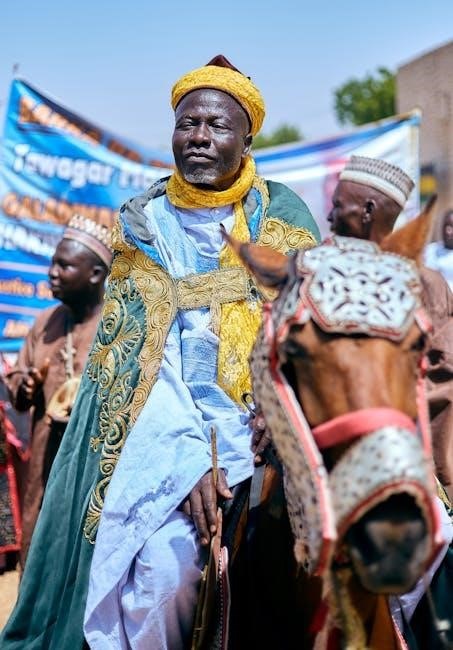
Historical Context
The play is set in Oyo‚ Nigeria‚ in 1946‚ during British colonial rule․ It reflects the clash between Yoruba traditions and colonial influence‚ exploring cultural tensions․
Setting: Oyo‚ Nigeria in 1946
Oyo‚ a historic Yoruba city in Nigeria‚ serves as the backdrop for the play․ The year 1946 marks the height of British colonial influence‚ creating tension between traditional Yoruba practices and imposed Western values․ The setting reflects the cultural and political dynamics of the time‚ with the kingdom grappling with colonial rule while adhering to ancient rituals․ This duality sets the stage for the tragic events that unfold․
Real Events and Cultural Significance
The play is based on real events in Oyo‚ Nigeria‚ in 1946‚ where the king’s death necessitated Elesin’s ritual suicide․ This Yoruba tradition underscores ancestral honor and communal balance․ Soyinka highlights the cultural clash when colonial officer Simon Pilkings intervenes‚ disrupting sacred rituals and sparking turmoil․ This historical incident reflects the broader struggle between tradition and colonialism‚ resonating deeply in post-colonial literature and discourse․
Plot Summary
Elesin‚ the King’s Horseman‚ must ritually suicide to honor his deceased king‚ but colonial officer Simon Pilkings intervenes‚ causing a tragic cultural clash and profound consequences․
The Story of Elesin and the King
Elesin‚ the King’s Horseman‚ is bound by Yoruba tradition to ritually follow his deceased king into the afterlife․ Set in Oyo‚ Nigeria‚ in 1946‚ the story revolves around Elesin’s sacred duty․ The king’s death triggers a cultural obligation‚ and Elesin prepares for his ritual suicide‚ honored by the village․ This act ensures the king’s safe passage and maintains cosmic balance․ The PDF highlights the profound spiritual and cultural significance of this tradition‚ central to Yoruba beliefs․
Intervention by Simon Pilkings
Simon Pilkings‚ a British colonial officer‚ intervenes to prevent Elesin’s ritual suicide‚ driven by a mix of compassion and colonial paternalism․ His actions disrupt the Yoruba tradition‚ causing a cultural clash․ Pilkings’ intervention‚ though well-meaning‚ leads to turmoil‚ as the village perceives it as a violation of sacred traditions․ The PDF highlights how this interference sparks outrage and shame‚ ultimately preventing Elesin from fulfilling his duty‚ and underscores the play’s themes of cultural conflict and colonial impact․ The consequences of Pilkings’ actions are profound and far-reaching․
Consequences of Cultural Clash
The intervention sparks outrage and shame‚ as Elesin fails to fulfill his sacred duty‚ dishonoring the king and his people․ The cultural clash deepens the divide between tradition and colonial rule‚ leading to widespread turmoil․ The PDF reveals how this disruption of Yoruba rituals undermines the community’s spiritual balance and identity․ The consequences highlight the tragic loss of cultural integrity and the devastating impact of colonial interference on traditional practices‚ leaving lasting scars on both individuals and society․ The play vividly portrays this irreparable damage․
Main Characters
Elesin Oba: The King’s Horseman‚ bound by tradition to follow the king into the afterlife․ Simon Pilkings: A colonial officer whose intervention disrupts sacred rituals‚ causing tragic consequences․
Elesin Oba: The King’s Horseman
Elesin Oba‚ the King’s Horseman‚ is a central figure in Yoruba tradition‚ tasked with ritually following the deceased king into the afterlife․ His duty is sacred‚ reflecting loyalty and honor․ The community reveres him as he prepares for his sacrificial journey‚ symbolizing the continuity of cultural values․ However‚ his failure to complete the ritual due to colonial intervention sparks tragedy‚ highlighting the clash between tradition and modernity while exploring themes of identity and cultural disruption․
Simon Pilkings: The Colonial Officer
Simon Pilkings‚ a British colonial officer‚ plays a pivotal role in disrupting the traditional Yoruba ritual․ His intervention to prevent Elesin’s sacrificial suicide stems from a misguided sense of progressivism and cultural ignorance․ Pilkings’ actions‚ though well-intentioned‚ reveal the deep divide between colonial paternalism and indigenous traditions․ His interference sparks chaos‚ leading to Elesin’s public failure and the collapse of cultural norms‚ ultimately highlighting the destructive impact of colonialism on native practices and identities․
Other Key Figures
Besides Elesin and Simon Pilkings‚ other key figures include the Praise-Singer‚ who narrates and contextualizes the ritual‚ and Iyaloja‚ the wise Mother of the Market‚ who embodies Yoruba traditions․ Elesin’s son also plays a significant role‚ representing the younger generation’s struggle with tradition and modernity․ These characters collectively highlight the cultural and emotional depth of the story‚ emphasizing the communal impact of the ritual and its disruption by colonial forces․

Themes and Symbols
Explores colonialism’s impact on Yoruba traditions‚ emphasizing duty‚ sacrifice‚ and cultural identity․ The horseman symbolizes loyalty and the clash between tradition and modernity․
Cultural Clash and Colonialism
The play vividly portrays the conflict between Yoruba traditions and British colonial rule․ Elesin’s ritual suicide is interrupted by Simon Pilkings‚ symbolizing the clash of cultural values․ The intervention highlights the tension between African traditions and Western modernity‚ exploring how colonialism disrupts indigenous practices․ This clash leads to tragic consequences‚ reflecting the deeper struggle of cultural identity under colonial domination․ The play critiques colonial interference and the erosion of traditional beliefs‚ emphasizing the resilience of Yoruba culture amidst external pressures․
Duty‚ Tradition‚ and Individuality
Elesin’s role as the king’s horseman binds him to a sacred duty‚ reflecting Yoruba traditions of honor and communal obligation․ His journey underscores the tension between individual desire and collective expectations․ The play highlights how tradition demands sacrifice‚ while individuality seeks expression․ Elesin’s ultimate failure to fulfill his duty reveals the internal conflict between personal will and cultural responsibility‚ critiquing the rigid expectations of tradition and the impact of external forces on personal choices․
Symbolism of the Horseman
The horseman‚ Elesin‚ symbolizes the bridge between life and death‚ embodying Yoruba traditions of honor and sacrifice․ His role represents cultural continuity and the collective soul of the community․ The horseman’s journey reflects the struggle between individual desire and communal duty‚ while his failure to fulfill his ritual underscores the fragility of tradition in the face of external forces․ The character’s symbolism extends to the universal themes of mortality‚ identity‚ and the clash between tradition and modernity‚ resonating deeply with audiences․
PDF Availability and Accessibility
The PDF of Death and the King’s Horseman is widely available online‚ accessible for free download on platforms like Scribd‚ academia․edu‚ and other educational resources for easy reading and study․
Downloading the Play
The PDF of Death and the King’s Horseman can be easily downloaded from various online platforms‚ including Scribd‚ academia․edu‚ and other educational websites․ Many versions are available for free‚ though some sites may require user registration․ The play is also accessible through university libraries and digital archives․ Ensure compatibility with your device for seamless reading․ Downloading the PDF provides convenient access to Soyinka’s exploration of cultural clash and tradition‚ allowing for in-depth study and analysis of the text․
Reading and Studying the PDF
Reading the PDF of Death and the King’s Horseman offers a convenient way to engage with Soyinka’s profound exploration of cultural conflict․ The digital format allows for easy navigation‚ highlighting‚ and annotation‚ making it ideal for academic or personal study․ Readers can focus on themes like tradition‚ colonialism‚ and identity while analyzing the complex characters and their motivations․ The PDF also enables access to the play’s poetic language and rich cultural references‚ enhancing the learning experience for students and literature enthusiasts alike․
Wole Soyinka‚ born Akinwande Oluwole Soyinka on July 13‚ 1934‚ is a Nobel Prize-winning Nigerian playwright and poet․ His work‚ Death and the King’s Horseman‚ is a seminal exploration of cultural identity and colonialism‚ showcasing his mastery of storytelling and deep connection to Yoruba traditions․ The PDF of the play is widely studied for its rich themes and historical significance․
Biography and Literary Contributions
Wole Soyinka‚ born Akinwande Oluwole Soyinka on July 13‚ 1934‚ is a Nigerian playwright‚ poet‚ and essayist․ His parents‚ Christians from different Yoruba-speaking ethnic groups‚ influenced his diverse cultural perspective․ Soyinka’s works blend traditional Yoruba elements with modern themes‚ addressing colonialism‚ identity‚ and cultural clashes․ His play‚ Death and the King’s Horseman‚ is a landmark in post-colonial literature‚ earning him global acclaim․ In 1986‚ he became the first African to win the Nobel Prize in Literature‚ cementing his legacy as a literary giant․ His writings continue to inspire scholars and readers worldwide‚ with the PDF of his play remaining a vital resource for academic and cultural studies․
Other Notable Works
Wole Soyinka’s literary contributions extend beyond Death and the King’s Horseman․ His notable works include The Lion and the Jewel‚ an early play exploring cultural identity‚ and Season of Anomy‚ a novel addressing societal fragmentation․ Additionally‚ Aké: The Years of Childhood is a memoir reflecting his upbringing and cultural influences․ These works‚ alongside his plays and essays‚ highlight his exploration of colonialism‚ tradition‚ and individuality‚ solidifying his status as a leading voice in African literature․ His writings remain essential for understanding post-colonial experiences and cultural dynamics․
Cultural and Historical Significance
Death and the King’s Horseman explores the clash between Yoruba traditions and British colonial rule in 1946 Nigeria‚ highlighting ritual suicide and cultural identity amidst colonial disruption․ The play reflects the tension between ancient customs and modernity‚ offering a profound commentary on cultural resilience and the impact of colonialism on indigenous practices‚ making it a seminal work in post-colonial literature․
Yoruba Traditions and Rituals
The play delves into Yoruba traditions‚ particularly the ritual suicide of the king’s horseman‚ Elesin‚ who must follow his ruler into the afterlife․ This sacred duty reflects the Yoruba worldview‚ emphasizing honor‚ ancestry‚ and communal responsibility․ The interruption by colonial officer Simon Pilkings underscores the clash between traditional rituals and colonial interference․ The play highlights the depth of Yoruba cultural practices and their significance in maintaining social harmony‚ while also exploring the tension between ancient customs and external influences in 1946 Nigeria․
Impact of Colonialism
The play vividly portrays the disruptive impact of colonialism on Yoruba traditions; The British colonial officer‚ Simon Pilkings‚ interferes with Elesin’s ritual suicide‚ reflecting the broader clash between colonial authority and indigenous customs․ This intervention not only disrupts the spiritual balance but also highlights the erosion of cultural practices under colonial rule․ The play critiques the imposition of Western values on African traditions‚ leading to a tragic cultural disintegration and conflict․ Soyinka’s work underscores the profound consequences of colonial interference on communal identity and heritage․
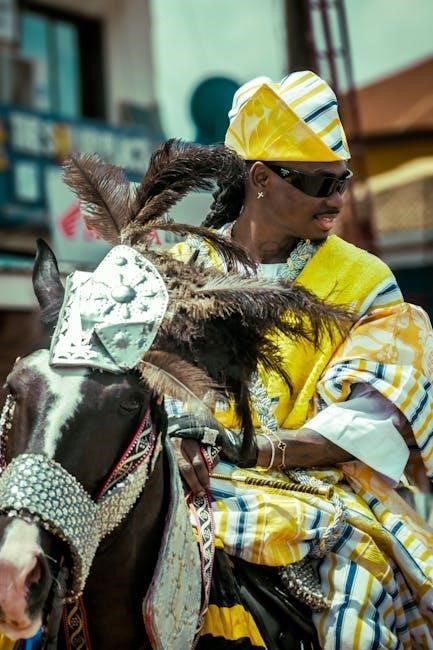
Reception and Reviews
Death and the King’s Horseman has received widespread critical acclaim for its profound exploration of cultural clashes and traditions․ Audiences and scholars praise its thought-provoking themes‚ highlighting the tension between colonialism and indigenous customs․ The play’s emotional depth and historical significance resonate deeply‚ making it a cornerstone of post-colonial literature; Soyinka’s masterful storytelling continues to captivate readers and inspire reflection on cultural identity and resilience;
Critical Acclaim and Analysis
Death and the King’s Horseman has garnered significant critical acclaim for its nuanced portrayal of cultural conflict and colonialism․ Scholars praise Soyinka’s exploration of tradition versus modernity‚ highlighting the play’s emotional depth and historical significance․ The tragic clash between Elesin’s ritual duty and Pilkings’ intervention is seen as a powerful metaphor for colonial disruption․ Analysts also commend the play’s rich dialogue and its ability to bridge Yoruba traditions with universal themes‚ solidifying its place in post-colonial literature․
Audience Reception
Death and the King’s Horseman has resonated deeply with audiences worldwide for its emotional intensity and cultural richness․ Readers and theatergoers alike appreciate its exploration of tradition‚ identity‚ and colonialism․ The play’s ability to evoke empathy and provoke reflection has made it a favorite in both academic and theatrical circles․ The availability of the PDF version has further expanded its reach‚ allowing global audiences to engage with Soyinka’s masterpiece and its profound commentary on cultural clashes and human dignity․
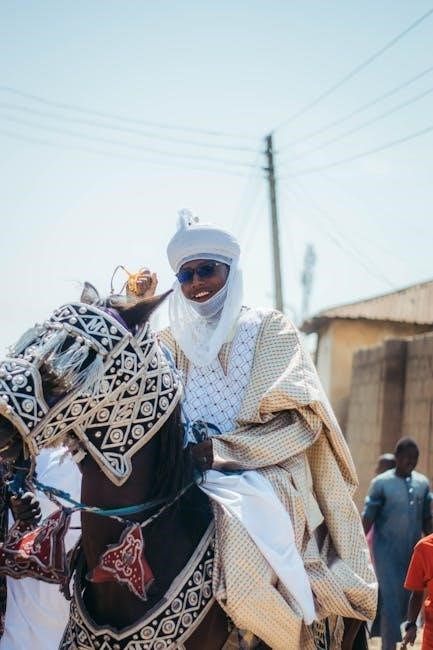
Comparative Analysis
Death and the King’s Horseman shares themes of cultural identity and colonialism with other works like The Lion and the Jewel and The Strong Breed‚ yet its ritual depth and unique colonial conflict make it distinct․ The PDF highlights these comparisons‚ showcasing Soyinka’s exploration of tradition and modernity across his works․
Similar Themes in Other Works
Death and the King’s Horseman resonates with themes found in Soyinka’s other works‚ such as The Lion and the Jewel and The Strong Breed‚ which also explore cultural identity and colonialism․ Similarly‚ authors like Chinua Achebe and Ngugi wa Thiong’o address the tension between tradition and modernity in works like Things Fall Apart and Devil on the Cross․ These narratives collectively highlight the complexities of cultural preservation and the impact of colonialism on indigenous traditions‚ offering a broader perspective on the themes Soyinka presents․
Unique Aspects of the Play
Death and the King’s Horseman stands out for its blend of Yoruba tradition and colonial history‚ offering a unique lens on cultural identity․ Soyinka’s masterful storytelling weaves ritual‚ duty‚ and individuality into a tragic narrative․ The play’s exploration of the horseman’s sacred role and its clash with colonial interference provides a profound critique of cultural disruption․ Its ability to balance deeply rooted traditions with the complexities of colonialism makes it a distinctive and impactful work in postcolonial literature‚ setting it apart from other similar narratives;
Death and the King’s Horseman remains a timeless tragedy‚ exploring cultural identity and colonialism․ Its legacy endures through Soyinka’s profound portrayal of tradition vs․ modernity‚ while the PDF ensures accessibility for deeper study and reflection on its enduring themes․
Final Thoughts
Death and the King’s Horseman is a profound exploration of cultural identity‚ tradition‚ and colonialism․ Elesin’s tragic fate underscores the devastating consequences of cultural misalignment․ Soyinka masterfully weaves Yoruba rituals with the intrusion of colonial rule‚ creating a timeless commentary on the clash between tradition and modernity․ The play’s enduring relevance lies in its ability to provoke reflection on identity‚ duty‚ and the resilience of cultural heritage․ The availability of the PDF version ensures that this vital work remains accessible for future generations to study and appreciate․
Legacy of the Play
Death and the King’s Horseman is a seminal work in post-colonial literature‚ leaving an indelible mark on global theater․ Its exploration of cultural identity‚ tradition‚ and colonialism continues to resonate‚ making it a cornerstone of academic study․ The play’s ability to bridge Yoruba traditions with universal themes ensures its relevance․ As a PDF‚ it remains accessible‚ preserving Soyinka’s critique of colonialism and celebration of cultural resilience for future scholars and readers‚ solidifying its enduring legacy in world literature․

